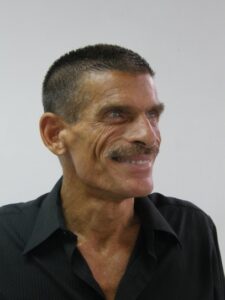Menu
Nicholas Faraclas
University of Puerto Rico

Of Romani (aka ‘gypsy’) and Greek descent, Dr Nicholas Faraclas is a Professor in Linguistics at the University of Puerto Rico, Rio Piedras. Having received his PhD from the University of California at Berkeley, a National Science Foundation Fellowship, and two Fulbright Fellowships, he has developed and taught a wide range of courses and published many books and numerous articles in the areas of theoretical, descriptive, socio-, and applied linguistics. Over the past four decades, he has been conducting research on postcolonial linguistics and colonial era contact languages as well as promoting community based literacy activities in the Caribbean, Latin America, Africa, Asia and the South Pacific. Contact: nickfaraclas@yahoo.com
Talk Information:
Longue durée and Durée profonde
August 4, 2023 | 9:00 AM
The complex temporal dimensions of longue durée encompass always dynamic and often contradictory continuities that extend from the very first years that hominins, including homo sapiens, emerged up until the present and into the future when, after centuries of demographic catastrophe due to the trade in the enslaved, the epicenter of the world’s population will continue to move ever more rapidly back to Africa. The complex spatial dimensions of longue durée encompass always dynamic and often contradictory continuities that extend across rainforests, mountains, deserts and oceans, none of which ever really constituted significant barriers for our wandering landborne and waterborne ancestors. Stretching all the way to the shores of the Americas across the Afro-Atlantic to the west, and all the way to the shores of the Americas across the Indo-Pacific to the east, these connections, which also embody disruptions, defy the linear, artificially constrained, hierarchical, monolithic, monodirectional and monocausal assumptions that underpin the colonial gaze of Western science in general and Western linguistics in particular; with our privileging of a dead monolithic, idealized langue/competence over multiplex, real, living parole/performance; with our obsession with abstract Eurocentric notions about language masquerading as ‘universals’; with our family tree models that fetishize varieties spoken by armies and hordes of conquering men; with our mission to impose a colonizing order and control over otherwise indeterminate configurations of repertoires by erecting non-existent boundaries between artificially reified individual ‘languages’ and, by even more dubious extension, between corresponding and equally artificially reified individual ‘cultures,’ ‘ethnicities’, ‘identities’, etc.
Up until now, most of those who have adopted a perspective that takes into account longue durée have argued that we must begin to consider historical contexts and influences which extend hundreds of years further into the past than is normally the case. In this contribution, I argue that it is only when we radically extend our notions of longue durée from only hundreds to several hundreds of thousands of years into the past that we can start to make real sense out of the present and begin to envision fulfilling futures for all. As human beings, we have been wandering and wondering over both land and water on this planet for at least 300,000 years, but it is only in the past 10,000 years or so, and beginning only in a few societies, that we have ‘gotten stuck’ (Horvath & Szakolczai, 2017; Graeber & Wengrow, 2021). For most of our ancestors, the process of getting stuck began only in the last few thousand years, as it gradually transmogrified into waves of conquest and colonialism that have now infected every corner of our world like a virus, slowly but inexorably strangling its host, both colonizer and colonized.